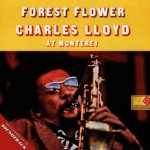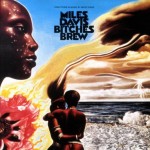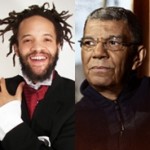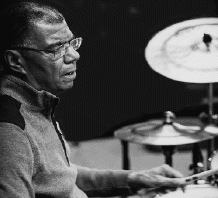Those of us who like to read the liner notes to musical releases often see the same names popping up over and over. Such is the case with the legendary jazz drummer Jack DeJohnette, whose credits include seminal albums with Charles Lloyd (Forest Flower) and Miles Davis (Bitches Brew), and who has also worked with the likes of Bill Evans, Sonny Rollins, Keith Jarrett, and Chick Corea in addition to leading his own bands over the years.
This interview was for a preview article for the 2/18/14 show at the Lobero Theatre in Santa Barbara by The Spring Quartet, which also features the talents of Joe Lovano (saxophone), Esperanza Spalding (bass, vocals), and Leo Genovese (piano). It was done by phone on 1/24/14.
Jeff Moehlis: What can we look forward to at the upcoming show?
Jack DeJohnette: You’re going to hear a combination of the talents of everybody. There will be compositions by all of us, and an exploration, playing written compositions but being open to spontaneous bursts of creativity, expanding on the improvisational aspect of the playing.
JM: Can you tell us about the strengths of this particular band?
JDJ: I think the strength lies in everybody’s fearlessness in the exploration of different types of music. In our improvisations, we’re willing to take risks and see what we get into. As is usually the case in situations that I’m involved in, there are lots of nice surprises, lots of great surprises.
JM: Do you have any plans to record with this band?
JDJ: Not at the moment. You know, it’s a new collaboration so we’ll be exploring it. It’s going to be like a work in progress. Each performance will be totally different from any other one.
The joy of playing together… everybody loves and respects everybody’s creative talents and their abilities in their own rights and in their own situations as leaders. It’s bringing everyone’s leadership qualities into this combination to see what we come up with. The reason we’re getting together is that we’re mutual admirers of each other’s musical talents.

JM: Way back when you played with one of Santa Barbara’s local jazz heroes, Charles Lloyd. What were some of the highlights of working with him?
JDJ: Charles and also Keith Jarrett and Cecil McBee, that was the first group I toured internationally with. And that quartet was basically a similar kind of framework to what I’m working with now. Fixed compositions but also open to taking explorations off the beaten path.
It was also one of the first groups to actually crossover, to have a crossover appeal to the younger generation, by virtue of the fact that we were playing concerts at the Fillmore West, Bill Graham’s legendary ballroom, and playing with people like Jefferson Airplane, the Grateful Dead, and Janis Joplin, just to name a few. Butterfield Blues Band. We had a first hit album called Dream Weaver, and we had a hit on there called “Sombrero Sam” that was played a lot on the radio. That was the first crossover group, and it was a significant period, with jazz moving out of just mainstream music and crossing over into the genres of pop and rock.

JM: A year ago they showed the documentary Arrows Into Infinity about Charles Lloyd at the Santa Barbara International Film Festival. It was interesting to hear about the trip to the Soviet Union. At the time, did you guys feel like you were really opening things up to that part of the world?
JDJ: It was exciting. It was during the Cold War period, so there was a lot of, shall we say, surveillance by KGB, all that kind of stuff. It was a tactical move by George Avakian, who was the manager, to actually get us to play music for the Russian people. They loved jazz, by way of listening to Willis Conover on Voice of America. We made headlines with that, and so it was a very strategic move on his part. So, yeah, it was a historic move for a group like ours. As you can tell from the documentary, it became a very important experience.
JM: You got involved with Miles Davis in time for his album Bitches Brew. What kind of direction was Miles giving at that time?

JDJ: Miles was utilizing the best musicians on their instruments possible, and going in the studio and giving a few minimal words about what to do. Just working with the grooves, at that point, not unlike what rock musicians would do. We’d go in the studio daily and have some grooves, and maybe some melodies and things like that. We’d get the grooves going and Miles would just direct soloists to play over it, and it would be edited by Teo Macero and put together in a comprehensive way. And it just turned out that it became another movement in music that crossed over, that exposed the broader aspects of jazz to a wider audience. And so, the Charles Lloyd Quartet and Miles Davis both did similar things. The Charles Lloyd Quartet preceded Miles at the Fillmore by a few years, you know. So you can see that there’s this thread that runs through a lot of my musical experiences, as a sideman and as a leader.
JM: One of my favorite guitarists is John McLaughlin. Is it true that you told Tony Williams about him and that ended up bringing him to the States?
JDJ: Well, I gave him a recording of John jamming with me and some other British musicians in London. I was there with Bill Evans. So I guess he heard it and sent for John.
JM: What are your thoughts on Teo Macero’s role and contributions to Bitches Brew and that era of recordings?
JDJ: The way he edited and used engineers that mixed and recorded everything, I mean, it was done on a really high level. Miles would record everything and Teo would edit it and send it to Miles, and Miles would say OK or not. They were a good team. Teo deserves a lot of credit, too.
JM: What advice would you give to an aspiring musician?
JDJ: Today it’s much more complicated to do that, to get yourself recognized on a broad scale. Because, shall we say, there’s more practitioners of music. I think a lot of it has to do with the music schools. There’s a limited amount of working situations for the players. The other thing, through iPhones and downloads and YouTube, it’s harder to make your living through the music, except through performances. Downloads don’t pay that much, so you have to be an entrepreneur and a musician, either by working with groups that have a bigger exposure or creating a grassroots kind of thing on your own, or networking with other people to create environments to perform the music.
JM: It’s a different time now, isn’t it?
JDJ: Very, very, very. You know, we are a part of a whole galactic intelligence here that has the ability to adapt to change. That’s what’s going to happen. That’s what’s happening now. It’s like improvisation. Life is improvisation. Species adapt, you know, adapt to the necessary enhancements to help them survive. That’s ongoing, all the time.
JM: What are your plans for the near future? Are there other things in the works as well?
JDJ: There’s a few other things in the works. I have two trios. One is with Ravi Coltrane and Matthew Garrison, the Jack DeJohnette Trio. Then I also have the Jack DeJohnette Group, which features special soloists. That group is Jerome Harris on the electric and acoustic bass and guitar, and George Colligan on the piano. George just recorded a trio record with Larry Grenadier and myself which will be coming out this year. Also, I’ve been using a special guest Don Byron on the clarinet and tenor saxophone. We’ve been touring the last few years, mostly in Europe and some in the States.

Also, there’s another project that I’m involved in with the amazing, innovative tap artist Savion Glover. If you’ve ever heard of the musical Bring in ‘da Noise, Bring in ‘da Funk, that was Savion. He’s also the tap dancer in Happy Feet. He’s like the John Coltrane of tap. He works off of improvising, so we’ve done some things with my group with Don Byron, and another tap artist Marshall Davis, Jr., up in Albany. It was amazing. It unites the improvisational and arranged concept of jazz music with rhythm and movement. It’s very, very different.
JM: Where are you speaking to me from?
JDJ: Upstate New York.


Discussion
No comments for “Interview: Jack DeJohnette”